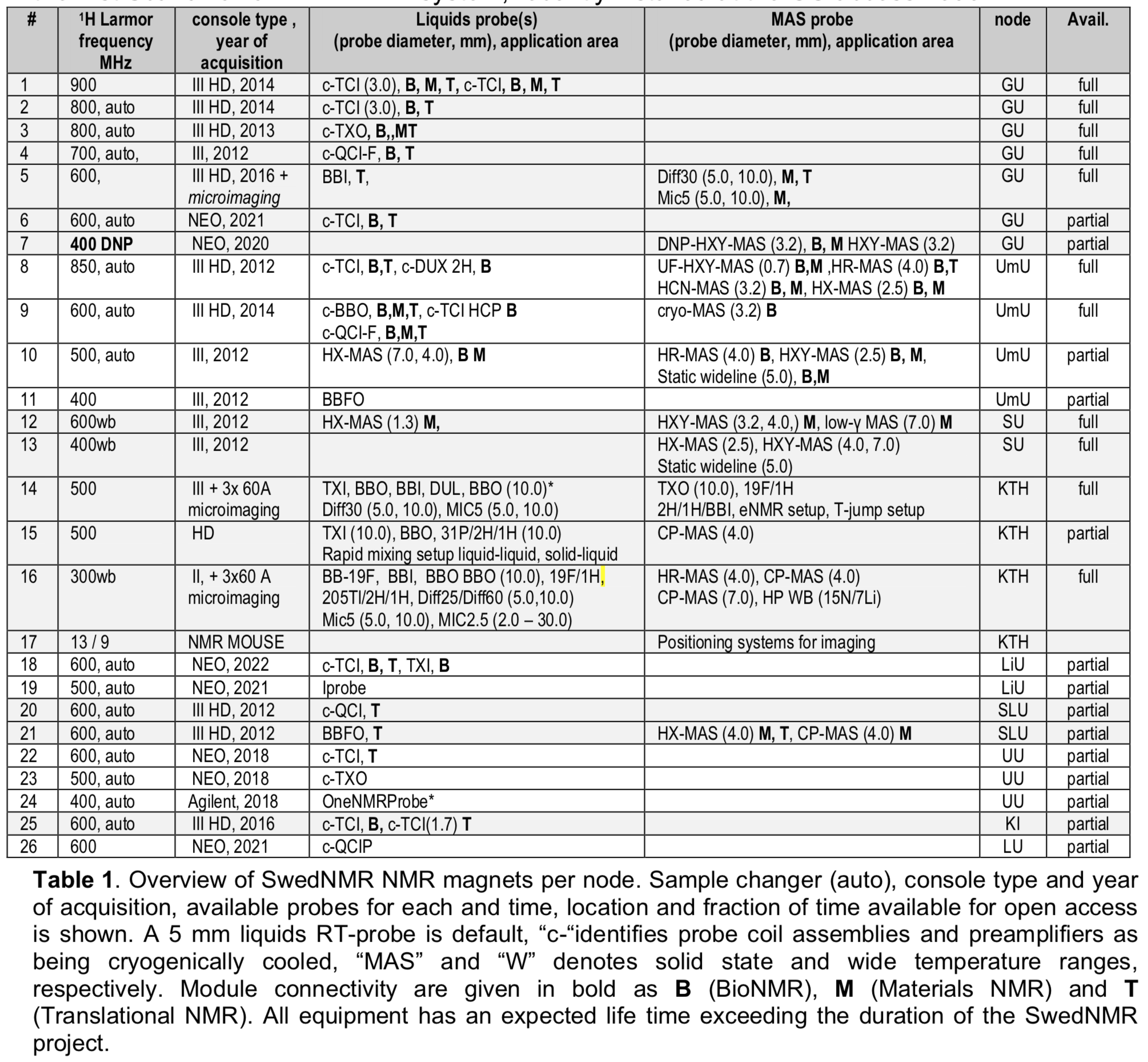Meetings and Training
SwedNMR will organise an annual user meeting which will provide a key platform for sharing of progress and experiences and will build on the previous bi-annual format established within the Swedish NMR community. The SwedNMR will provide mini-symposia, hands-on training and targeted workshops focusing on new methodologies and practical applications. These will be directed to larger user groups as well as more focused groups of students and postdocs.
Biomolecular module
The Biomolecular module in SwedNMR offer an infrastructure for studies structure, dynamics, and interactions of large biomolecular systems including but not limited to
- Proteins: soluble, insoluble, large systems, complexes
- RNA
- Aggregates such as fibrils and biomembranes
- Intrinsically disordered proteins (IDPs) and membrane-less organelles formed by liquid-liquid phase separation (LLPS).
The Biomolecular NMR module offers broad access to internationally competitive NMR instrumentation including high field instruments (800 MHz and 900 MHz), liquid- and solid-state NMR, DNP, robotics and SapleJet’s as well as state-of-the-art methods, competence, and training.
Staff scientists at the Biomolecular NMR access nodes perform active research to continuously develop NMR technology and offer expert-level support with regard to implementation of new and advanced NMR techniques, assistance with experimental design and data interpretation.
Materials module
Case studies
DNP NMR in biobased cellulose binder
Materials NMR module in SwedNMR infrastructure offers broad access to internationally competitive NMR instrumentation, methods, and competence for researchers studying and developing e. g. battery materials, photovoltaics, heterogeneous catalysis, carbon materials, wood-based materials, polymers and natural fibers, composites, gels, glasses, cements, porous scaffolds, and biomaterials. In addition to information complementary to scattering or electron microscopic experiments Materials NMR can provide unique structural data about non-crystalline materials and information on local molecular/atomic/ionic dynamics.
Materials NMR module offers a wide variety of advanced NMR instrumentation. In addition to the DNP-NMR, providing an enormous advantage regarding signal-to-noise that is sought in many cases, this module provides access to high-speed MAS and cryogenic-MAS technology, to probes optimized for detection of insensitive nuclei, microimaging probes for spatially resolved characterization of materials, probes with an extended temperature range up to 600°C. MAS sample changer for high-throughput applications is available.
Staff scientists at Materials NMR access nodes perform active methodological research to continuously develop NMR technology and thus offer expert-level support with regard to implementation of new and advanced NMR techniques, assistance with experimental design and data interpretation.
Translational module
Case studies
Translational NMR includes several application areas, such as:
- Metabolomics
- Small molecule structure determination
- Fragment-based screening (FBS)
SwedNMR offers a wide variety of highly specialized instrumentation tailored for all three application areas.
For metabolomics, liquid handling systems and high-field spectrometers (500-850MHz) equipped with cryoprobes, conventional probes or HR-MAS probes coupled with sample changers for both liquid-state (SampleJet) and tissue samples (SamplePro) are available.
Considering the wide range of available spectrometers within SwedNMR, an optimal setup for almost any small molecule project can be accommodated. Spectrometers from 400MHz to 900MHz are available as well as probes designed for detection of most nuclei (14N and upwards), some of which that has extended temperatures ranges (-80-+130oC). A glove-box for sample preparation of sensitive materials is also available for special applications.
Two fragment libraries are available for FBS, one containing 800 fragments and the other 426 19F-labelled fragments. SampleJet sample changers are available at 600 and 700 MHz spectrometers equipped with probes optimized for either 1H or 19F detection. Pipetting robots with cooling are available for sample preparation.
In all three application areas, SwedNMR personnel have extensive experience with various sample preparation techniques, implementation of NMR experiments and data analysis.
Instrumentation available within SwedNMR







